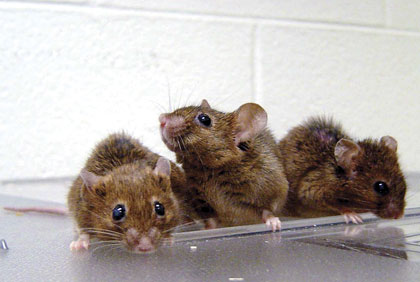Researchers at UT Southwestern Medical Center have discovered that a protein prolonging life in mice works by controlling insulin. Scientists Find That Protein Controls
Aging By Controlling Insulin
UT Southwestern researchers, led by Dr. Makoto Kuro-o, assistant professor of pathology, have discovered that a protein prolonging life in mice works by controlling insulin. The protein, Klotho, is found in several species. Therapies based on Klotho could eventually prove to be a way to extend life or slow its effects.
The protein, Klotho, is found in several species. In mice, the researchers discovered, it acts as a hormone, circulating through the blood and binding to cells.
Therapies based on this hormone could prove to be a way to extend life or slow its effects, said Dr. Makoto Kuro-o, assistant professor of pathology and senior author of the study published in today's online issue of Science Express and appearing in an upcoming issue of Science. "It could be one of the significant steps for developing anti-aging therapy."
Dr. Kuro-o and his colleagues originally discovered the Klotho gene in 1997, naming it after one of the mythical Greek fates who controlled the length of human life. Their previous studies have shown that mutant mice lacking the Klotho gene appear normal until about 3 to 4 weeks old, and then begin showing signs of age, such as skin atrophy, osteoporosis, arteriosclerosis and emphysema. The mice died prematurely at about two months.
For the current study, they created a second strain of mutant mice in which the Klotho gene generated more of the protein than in normal mice. Those mice lived between 19 percent to 31 percent longer than normal mice.
The researchers were especially interested in how the hormone affected insulin, because making an animal resistant to insulin increases its lifespan - a phenomenon found in animals ranging from worms to fruit flies to mice.
The mice with higher levels of Klotho had more insulin in their system than the normal mice, suggesting that the Klotho mice were resistant to insulin; they had to make more of it to make up for the resistance. The opposite was true with the mice deficient in Klotho. They were more sensitive to insulin and had reduced levels of it.
The influence on insulin creates a problem for Klotho should it be used as a therapy against aging: It may extend life, but it could also make an animal diabetic.
Mice with the excessive Klotho also had fewer offspring than normal mice, said Dr. Kuro-o, a Southwestern Medical Foundation Scholar in Biomedical Research.
Other UT Southwestern researchers involved in the study were Dr. Hiroshi Kurosu, senior research associate in pathology and lead author; Dr. Masaya Yamamoto, postdoctoral researcher in pathology; Jeremy Clark, research technician in pathology; Johanne Pastor, senior research associate in pathology; Dr. Animesh Nandi, research scientist in pathology; Prem Gurnani, research associate in pathology; Dr. Yoshiharu Takayama, postdoctoral researcher in molecular genetics; Dr. Joachim Herz, professor of molecular genetics and in the Center for Basic Neuroscience, and Dr. Kevin Rosenblatt, assistant professor in pathology. Researchers from Vanderbilt University School of Medicine, the University of Tokyo, Osaka University and Joslin Diabetes Center also participated.
The work was supported by the Endowed Scholars Program in Medical Science at UT Southwestern, The Pew Scholars Program in the Biomedical Sciences, the Eisai Research Fund, the High Impact/High Risk Research Program at UT Southwestern and the National Institutes of Health.
Refs
and further readingHOME
Resveratrol
Immortality?
Living Longer
Selegiline.com
Immortal Youth?
Longevity Genes
Supercentenarians
Reengineering the body?
Caloric restriction prolongs life
New treatments for aging brains
World's Oldest Supercentenarians
